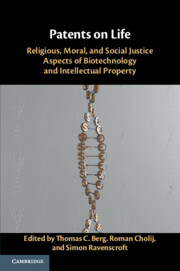 Patents on Life
Patents on Life from Closing
Published online by Cambridge University Press: 28 September 2019
This closing chapter summarizes the book’s themes. By gathering religious, secular moral, legal, and sociopolitical perspectives in one place, the book aims to be a resource so lawyers, policy activists, and policymakers in patent debates might better understand what religious perspectives have to offer, and so religious thinkers and leaders might better understand biotech patents and thus have more to offer. Three themes emerge from the balance of the chapters. First, patents on life call for evaluation under criteria of morality and social justice. Second, religious thought can contribute to–not dominate, but contribute to–such moral and social evaluation. Finally, however, for religious thought to contribute effectively, it must be better informed and sophisticated than it has been, about both patent law and biotechnology.
To save this book to your Kindle, first ensure no-reply@cambridge.org is added to your Approved Personal Document E-mail List under your Personal Document Settings on the Manage Your Content and Devices page of your Amazon account. Then enter the ‘name’ part of your Kindle email address below. Find out more about saving to your Kindle.
Note you can select to save to either the @free.kindle.com or @kindle.com variations. ‘@free.kindle.com’ emails are free but can only be saved to your device when it is connected to wi-fi. ‘@kindle.com’ emails can be delivered even when you are not connected to wi-fi, but note that service fees apply.
Find out more about the Kindle Personal Document Service.
To save content items to your account, please confirm that you agree to abide by our usage policies. If this is the first time you use this feature, you will be asked to authorise Cambridge Core to connect with your account. Find out more about saving content to Dropbox.
To save content items to your account, please confirm that you agree to abide by our usage policies. If this is the first time you use this feature, you will be asked to authorise Cambridge Core to connect with your account. Find out more about saving content to Google Drive.